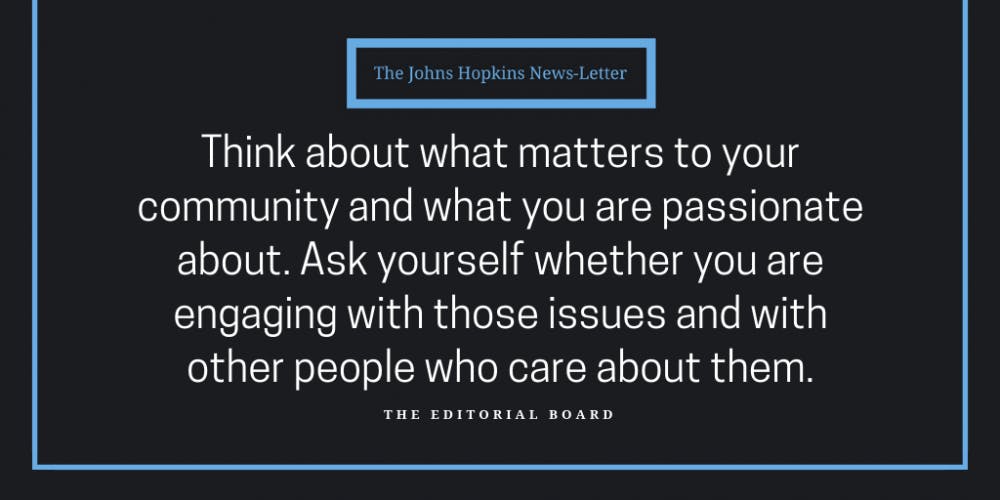It’s not election month. It’s not even an election year. And yet, we want to take the time to remind our fellow students of the most important civic duty granted to us: voting for what we believe in.
This past Tuesday was National Voter Registration Day. The holiday’s aim is to increase voter registration across the country. Hopkins participated by hosting Hopkins Votes, which was a collaboration between the Center for Social Concern (CSC) and student groups like IDEAL and Student Government Association (SGA) that encouraged students to register to vote through a variety of tabling and open house events.
Hopkins Votes also made use of the University’s partnership with TurboVote, an online service that streamlines the voter registration process. The campaign further emphasized how simple it was for students to get involved in not only voting, but politics as a whole.
However, we want to remind students that it’s not just voting that makes a difference. It’s also protesting against things that you believe are harmful for the community. It’s hosting discussions that allow students with a variety of perspectives to share their voices. And it’s making your own voices heard in the issues you care for. We’re proud to see Hopkins students rallying behind the causes that they are passionate about.
Over the past several years, we’ve seen that students can make an impact. In Spring 2018, Advocates for Disability Awareness fought for better on-campus facilities. Now Hopkins is constructing a new Office of Student Disability Services, making Homewood Campus more accessible.
It may be frustrating when the University does not always act in student interests. For years, the student advocacy group Refuel Our Future demanded that the University fully divest from fossil fuels. In 2017, the Board of Trustees only partially met these demands, voting to divest the University’s endowment from thermal coal. That wasn’t enough, but even that decision would not have happened without the persistence of student activists.
In Spring 2018, the University introduced a bill that would institute a private police force, meeting widespread backlash from students and community members. Now, we face the reality of an impending police force. It was because of students, however, that lawmakers pulled the bill for further review in May 2018. It was after students organized that administrators solicited community feedback. And it was student activists at Hopkins that contributed to a national conversation around private police forces on college campuses.
Most recently, Hopkins announced that its yearly contracts with the U.S. Department of Immigrations and Customs Enforcement will not be renewed. Though the University did not explain why, the decision follows months of student protests, which included a month-long sit-in against both the contracts and the Community and Safety Strengthening Act.
We know that students can make a difference on an international scale as well. This week is the Global Week for Future, a campaign of climate strikes held around the world, urging world leaders to protect our planet. Last Friday, thousands of students skipped school to make their concerns about the inaction on climate change heard. Rallying behind 16 year-old Greta Thunberg, who has been a loud voice for the collective cause, these young activists are forcing people in power to pay attention to them. And although it’s too early to see what changes this campaign may bring, we believe it was a powerful demonstration of what people of all demographics can do by being engaged and active.
Yet protesting isn’t the only way to be engaged and politically active. Being informed of current news events is a critical part of being civically engaged. In the face of U.S. President Donald Trump’s impending impeachment trials, that has become more imperative than ever.
It can be frustrating to feel like you can do nothing but sit and watch as the slow process unravels. However, we urge our fellow students to pay attention, listen to the facts and make informed judgements. The impeachment process may be long and meticulous, but simply following along as the details come to light is a great way to stay engaged with politics. Whether you can vote or not, staying informed is a part of your civic duty.
If just following the news is too passive, there are multiple ways to take action on the issues that concern you. The most important way is also the simplest: talking. Sharing your thoughts on the latest issues with your friends is an important part of being engaged. Talking with people outside your political sphere is an obvious but unfortunately uncommon way to take this to the next level. In turn, listen to those who may not share your views.
On campus, an option is to reach out to SGA. Our student representatives may have limited power over the administration, but they have the power to implement small and meaningful changes in our community. They are there to advocate for our concerns. Interact with them. If you want to write (which we highly encourage), publications like The News-Letter are great for giving you a platform to make your opinions heard. All of these are ways to get yourself and others to keep thinking about what’s going on in the world and how it affects us all.
Whether it’s our campus, our city, our nation or our planet, we are all members of many different communities. And within each community, our voices are valuable. Finding ways to be engaged is not only important, but also necessary for any form of democracy to function.
Think about what matters to your community and what you are passionate about. Ask yourself whether you are engaging with those issues and with other people who care about them. If not, we encourage you to start engaging. That can start with something as simple as reading the news. The bottom line is: do something. National Voter Registration Day is just the first step. It’s up to us to continue to fight for what we believe in.

















